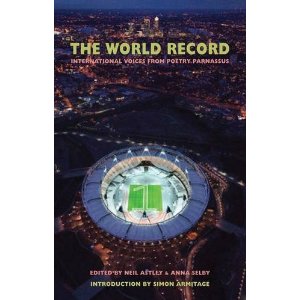Poetry Parnassus, the London 2012 Olympics, and Decolonization

Even though my homeland of Guam is a colony of the United States, Guam received International Olympic Committee recognition in 1987 and competed the following year in Seoul, Korea, and in every Olympics since then.
For the Telegraph's London 2012 Olympic Games coverage, they created a webpage for every competing country. These pages highlight the countries' medal history, star performers, national anthem, and general facts. Some of the pages also include "The country's history in six words." Guam's history reads: "Tug-of-war; unauthorised US helipad."
Guam became a territory of the U.S. as a result of the Spanish American War of 1898. Since then, my home island has become one of the most militarized places in the world and remains on the United Nations list of 16 non-self governing territories.
The United States has won 2291 medals since it first participated in the 1896 Olympics. Guam has never won an Olympic medal.
During the upcoming London 2012 Olympics, the Southbank Center is organizing Poetry Parnassus, a weeklong series of events that will feature poets from each of the 204 competing Olympic countries. This event harkens back to the poetry events of the ancient Olympics in Greece (see the Guardian article, "Poetry Parnassus to gather poets from every Olympic nation").
I feel honored and humbled to have been nominated and chosen by the organizers to represent Guam at this Cultural Olympiad event.
In some ways, I might feel right at home in London since it will be militarized during the Olympics. With more than 10,000 security guards, 10,000 military personnel, and 500 U.S. FBI agents! Surface-to-air missiles will be at the ready, a Royal Navy battleship will be offshore, lightweight aerial drones will hover overhead, snipers will be in place, and elite and fully armed police units will be on patrol. Sounds like a Pacific paradise to me.
And where there is military and imperial nationalism, there will be corporations and predatory capitalism! See Jules Boykoff's article, "What is the real price of the London Olympics?" (2012), in which he tracks how the Olympics are a grand display of "'celebration capitalism'—disaster capitalism's affable cousin."
Boykoff also quotes from the Olympic Charter: "no kind of demonstration or political, religious or racial propaganda is permitted in any Olympic sites, venues or other areas."
Um, then where am I going to read my poetry?
Interestingly, many poets chosen for Poetry Parnassus are also political activists. While I was reluctant to participate in an event associated with the Olympics, I feel it is also important to take this opportunity to engage and strategize with other politicized poets from around the world (see the list of poets here) who are writing against the forces of militarization, imperialism, and global capitalism that are destroying our countries.
In 2008, I testified to the United Nations' Special Political Committee on Decolonization (Fourth Committee), which aims to decolonize the remaining non-self-governing territories. I testified on the devastating cultural and environmental effects that U.S. militarization has caused in Guam (you can read my testimony in my second book). For more than 30 years, my people have testified to the United Nations and the international community has done very little to help liberate us from U.S. colonialism. Yet we still continue to testify. We will not be silent.
By sharing my poetry, I hope to represent the sovereign spirit of my people, as well as Guam's aspirations for sovereignty. And to stand alongside the other poets from Moana Nui and all the poets from colonized countries. Perhaps it is this international community of poets that will prove to be more empowering. "Fanoghe Chamorro put i tano-ta."
Craig Santos Perez is a native Chamoru (Chamorro) from the Pacific Island of Guåhan/Guam. He is the ...
Read Full Biography

